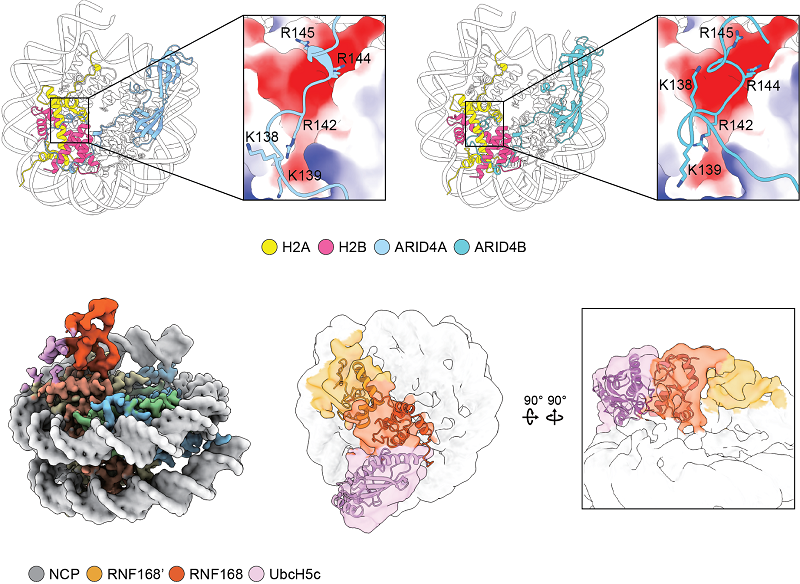
Newsroom
A research team led by Prof. ZHOU Zheng from the Institute of Biophysics of the Chinese Academy of Sciences, in collaboration with Prof. XU Chunfu at the National Institute of Biological Sciences, Beijing, has developed a comprehensive online database and analysis platform for nucleosome-binding proteins (http://bigdata.ibp.ac.cn/ncpbindersdatabase-app, http://bigdata.ibp.ac.cn/analysis-app).
The work, published in Nucleic Acids Research on August 6, leverages the latest AlphaFold3 artificial intelligence to screen more than 7,600 human nuclear proteins and generates 38,390 structural models.
Nucleosomes, the fundamental unit of chromatin, plays a central role in precise gene regulation through its interactions with a wide array of proteins. Understanding the structural features and interaction mechanisms of nucleosome-binding proteins is essential for advancing epigenetics, uncovering disease mechanisms, and developing innovative therapeutic strategies. However, traditional experimental approaches to studying these complex interactions remain costly and time-consuming.
A highlight of the study is the development of an original Strength Factor (SF) scoring system, which quantifies the strength of protein-nucleosome interactions-essentially assigning each protein a "handshake score" with the nucleosome.
This system integrates spatial distance constraints to assess direct physical contacts, and confidence metrics (PAE and pLDDT) to evaluate the reliability of predicted structures. These criteria allow the researchers to pinpoint genuine nucleosome-binding proteins within massive structural datasets.
The platform itself supports multiple file formats (PDB, CIF, JSON), offering the community a versatile tool for in-depth structural analysis.
Using this framework, the researchers identified ARID4A and ARID4B as previously unrecognized nucleosome-binding proteins. Experiments confirmed that the HBD domains of ARID4A/4B specifically engage with the nucleosome acidic patch, and key interaction residues were mapped.
The researchers also uncovered that dimerization of RNF168, a ubiquitin E3 ligase, is essential for its stable association with nucleosomes. This discovery, validated by cryo-electron microscopy, provides critical clues to the mechanisms of DNA damage repair. Strikingly, the study further showed that AlphaFold3 can capture protein-nucleosome interaction details that are often missing from experimentally resolved structures.
This work introduces a rapid and effective computational strategy for the discovery and characterization of nucleosome-binding proteins. Beyond serving as a valuable resource for chromatin biology, the new database and analysis platform hold significant promise for advancing epigenetic research, clarifying disease pathways, and informing the development of targeted therapeutics.

ARID4A/4B Recognition of the Nucleosome and RNF168 Dimerization Enhance Nucleosome Interactions (Image by ZHOU Zheng's group)
